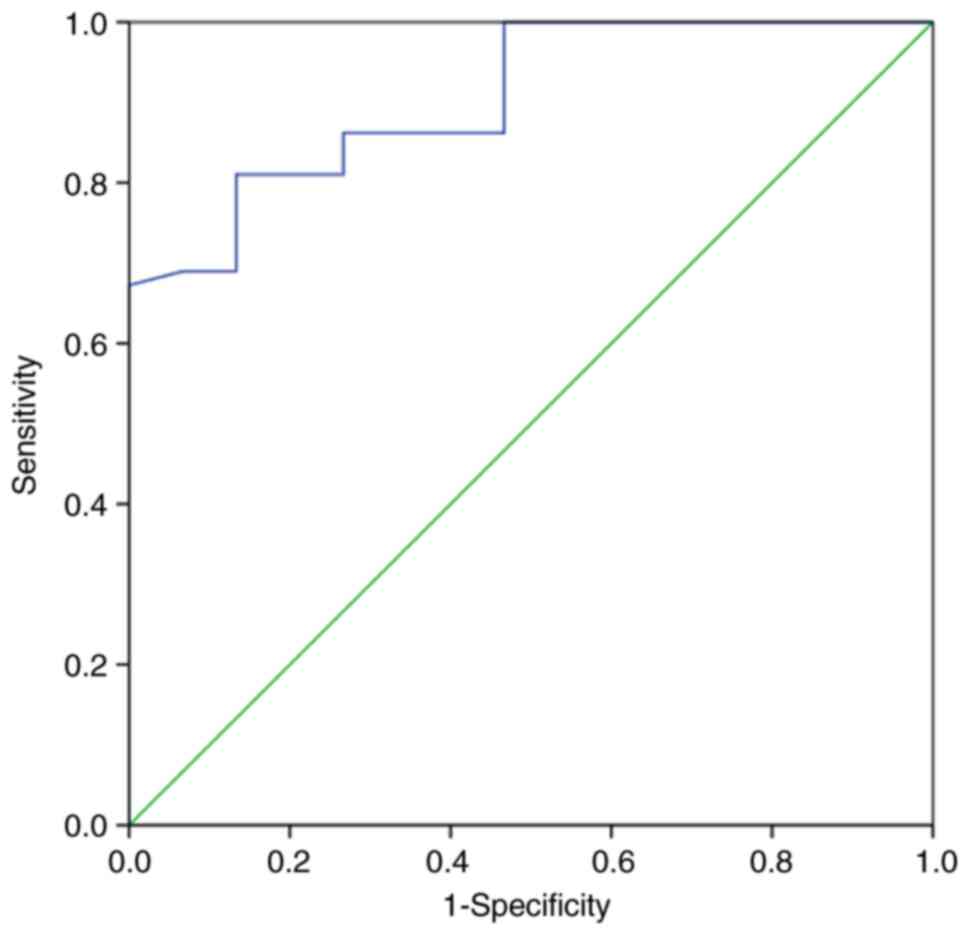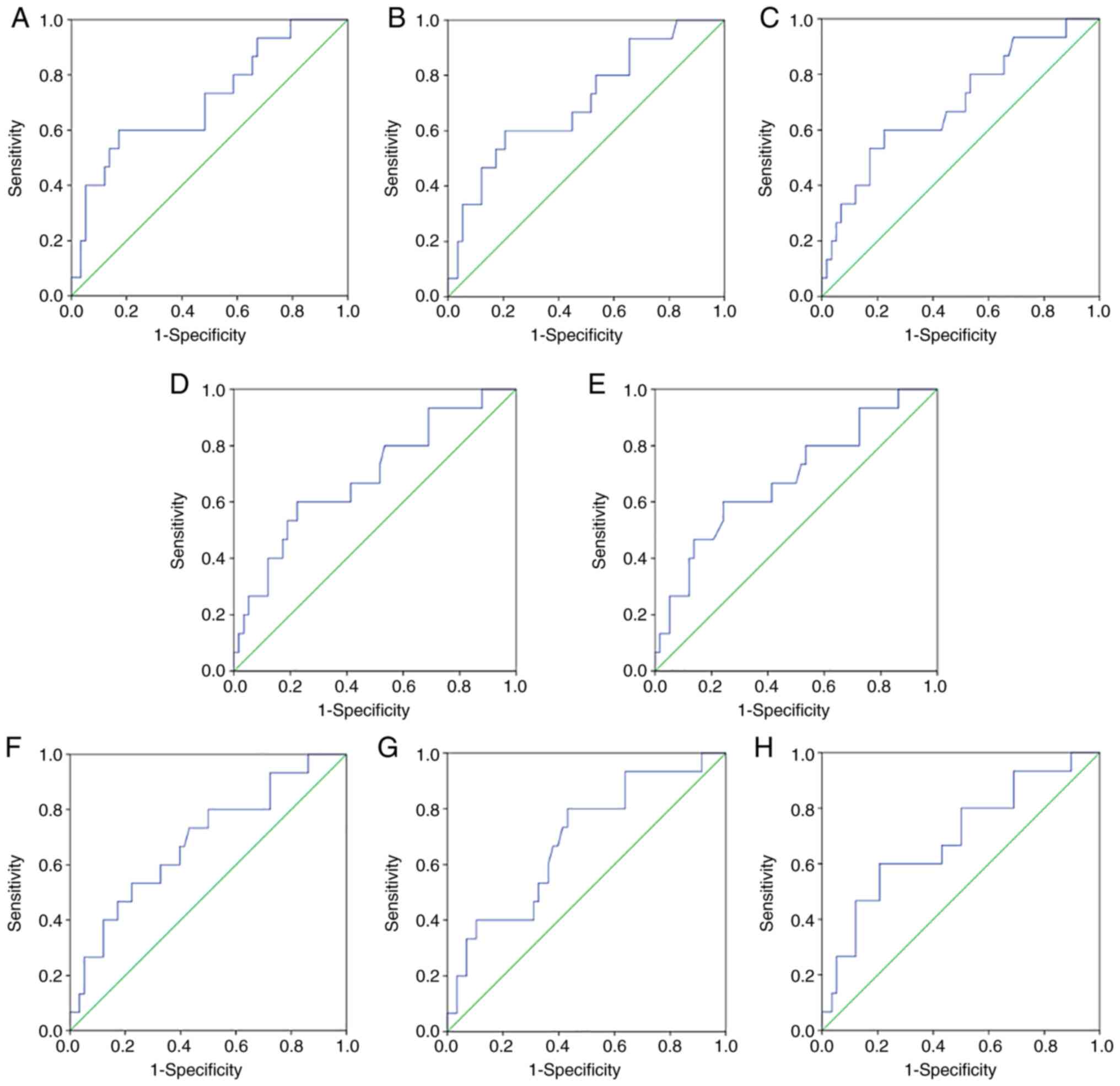|
1
|
Mendenhall WM, Werning JW, Hinerman RW,
Amdur RJ and Villaret DB: Management of T1-T2 glottic carcinomas.
Cancer. 100:1786–1792. 2004. View Article : Google Scholar : PubMed/NCBI
|
|
2
|
Beitler JJ and Johnson JT: Transoral laser
excision for early glottic cancer. Int J Radiat Oncol Biol Phys.
56:1063–1066. 2003. View Article : Google Scholar : PubMed/NCBI
|
|
3
|
Back G and Sood S: The management of early
laryngeal cancer: Options for patients and therapists. Curr Opin
Otolaryngol Head Neck Surg. 13:85–91. 2005. View Article : Google Scholar : PubMed/NCBI
|
|
4
|
Carlé A, Pedersen IB, Knudsen N, Perrild
H, Ovesen L and Laurberg P: Gender differences in symptoms of
hypothyroidism: A population-based DanThyr study. Clin Endocrinol
(Oxf). 83:717–725. 2015. View Article : Google Scholar : PubMed/NCBI
|
|
5
|
Floriani C, Gencer B, Collet TH and
Rodondi N: Subclinical thyroid dysfunction and cardiovascular
diseases: 2016 Update. Eur Heart J. 39:503–507. 2018. View Article : Google Scholar : PubMed/NCBI
|
|
6
|
Biondi B, Cappola AR and Cooper DS:
Subclinical hypothyroidism: A review. JAMA. 322:153–160. 2019.
View Article : Google Scholar : PubMed/NCBI
|
|
7
|
Rodondi N, den Elzen WP, Bauer DC, Cappola
AR, Razvi S, Walsh JP, Asvold BO, Iervasi G, Imaizumi M, Collet TH,
et al: Subclinical hypothyroidism and the risk of coronary heart
disease and mortality. JAMA. 304:1365–1374. 2010. View Article : Google Scholar : PubMed/NCBI
|
|
8
|
Okubo M, Itonaga T, Saito T, Shiraishi S,
Mikami R, Sakurada A, Sugahara S, Park J, Tokuuye K and Saito K:
Predictive factors for local control of early glottic squamous cell
carcinomas after definitive radiotherapy. Mol Clin Oncol.
12:541–550. 2020.PubMed/NCBI
|
|
9
|
Sommat K, Ong WS, Hussain A, Soong YL, Tan
T, Wee J and Fong KW: Thyroid V40 predicts primary hypothyroidism
after intensity modulated radiation therapy for nasopharyngeal
carcinoma. Int J Radiat Oncol Biol Phys. 98:574–580. 2017.
View Article : Google Scholar : PubMed/NCBI
|
|
10
|
Lee V, Chan SY, Choi CW, Kwong D, Lam KO,
Tong CC, Sze CK, Ng S, Leung TW and Lee A: Dosimetric predictors of
hypothyroidism after radical intensity-modulated radiation therapy
for non-metastatic nasopharyngeal carcinoma. Clin Oncol (R Coll
Radiol). 28:e52–e60. 2016. View Article : Google Scholar : PubMed/NCBI
|
|
11
|
Lertbutsayanukul C, Kitpanit S, Prayongrat
A, Kannarunimit D, Netsawang B and Chakkabat C: Validation of
previously reported predictors for radiation-induced hypothyroidism
in nasopharyngeal cancer patients treated with intensity-modulated
radiation therapy, a post hoc analysis from a phase III randomized
trial. J Radiat Res. 59:446–455. 2018. View Article : Google Scholar : PubMed/NCBI
|
|
12
|
Fan CY, Lin CS, Chao HL, Huang WY, Su YF,
Lin KT, Tsai IJ and Kao CH: Risk of hypothyroidism among patients
with nasopharyngeal carcinoma treated with radiation therapy: A
population-based cohort study. Radiother Oncol. 123:394–400. 2017.
View Article : Google Scholar : PubMed/NCBI
|
|
13
|
Luo R, Li M, Yang Z, Zhan Y, Huang B, Lu
J, Xu Z and Lin Z: Nomogram for radiation-induced hypothyroidism
prediction in nasopharyngeal carcinoma after treatment. Br J
Radiol. 90:201606862017. View Article : Google Scholar : PubMed/NCBI
|
|
14
|
Sunwoo JB, Herscher LL, Kroog GS, Thomas
GR, Ondrey FG, Duffey DC, Solomon BI, Boss C, Albert PS, McCullugh
L, et al: Concurrent paclitaxel and radiation in the treatment of
locally advanced head and neck cancer. J Clin Oncol. 19:800–811.
2001. View Article : Google Scholar : PubMed/NCBI
|
|
15
|
Tell R, Lundell G, Nilsson B, Sjödin H,
Lewin F and Lewensohn R: Long-term incidence of hypothyroidism
after radiotherapy in patients with head-and-neck cancer. Int J
Radiat Oncol Biol Phys. 60:395–400. 2004. View Article : Google Scholar : PubMed/NCBI
|
|
16
|
Tell R, Sjödin H, Lundell G, Lewin F and
Lewensohn R: Hypothyroidism after external radiotherapy for head
and neck cancer. Int J Radiat Oncol Biol Phys. 39:303–308. 1997.
View Article : Google Scholar : PubMed/NCBI
|
|
17
|
Ling S, Bhatt AD, Brown NV, Nguyen P,
Sipos JA, Chakravarti A and Rong Y: Correlative study of dose to
thyroid and incidence of subsequent dysfunction after head and neck
radiation. Head Neck. 39:548–554. 2017. View Article : Google Scholar : PubMed/NCBI
|
|
18
|
Diaz R, Jaboin JJ, Morales-Paliza M,
Koehler E, Phillips JG, Stinson S, Gilbert J, Chung CH, Murphy BA,
Yarbrough WG, et al: Hypothyroidism as a consequence of
intensity-modulated radiotherapy with concurrent taxane-based
chemotherapy for locally advanced head-and-neck cancer. Int J
Radiat Oncol Biol Phys. 77:468–476. 2010. View Article : Google Scholar : PubMed/NCBI
|
|
19
|
Grande C: Hypothyroidism following
radiotherapy for head and neck cancer: Multivariate analysis of
risk factors. Radiother Oncol. 25:31–36. 1992. View Article : Google Scholar : PubMed/NCBI
|
|
20
|
Boomsma MJ, Bijl HP and Langendijk JA:
Radiation-induced hypothyroidism in head and neck cancer patients:
A systematic review. Radiother Oncol. 99:1–5. 2011. View Article : Google Scholar : PubMed/NCBI
|
|
21
|
Zhai RP, Kong FF, Du CR, Hu CS and Ying
HM: Radiation-induced hypothyroidism after IMRT for nasopharyngeal
carcinoma: Clinical and dosimetric predictors in a prospective
cohort study. Oral Oncol. 68:44–49. 2017. View Article : Google Scholar : PubMed/NCBI
|
|
22
|
Vogelius IR, Bentzen SM, Maraldo MV,
Petersen PM and Specht L: Risk factors for radiation-induced
hypothyroidism: A literature-based meta-analysis. Cancer.
117:5250–5260. 2011. View Article : Google Scholar : PubMed/NCBI
|
|
23
|
Sachdev S, Refaat T, Bacchus ID,
Sathiaseelan V and Mittal BB: Thyroid V50 highly predictive of
hypothyroidism in head-and-neck cancer patients treated with
intensity-modulated radiotherapy (IMRT). Am J Clin Oncol.
40:413–417. 2017. View Article : Google Scholar : PubMed/NCBI
|
|
24
|
Rønjom MF, Brink C, Bentzen SM, Hegedüs L,
Overgaard J and Johansen J: Hypothyroidism after primary
radiotherapy for head and neck squamous cell carcinoma: Normal
tissue complication probability modeling with latent time
correction. Radiother Oncol. 109:317–322. 2013. View Article : Google Scholar : PubMed/NCBI
|
|
25
|
Heidari S, Babor TF, De Castro P, Tort S
and Curno M: Sex and gender equity in research: Rationale for the
SAGER guidelines and recommended use. Res Integr Peer Rev. 1:22016.
View Article : Google Scholar : PubMed/NCBI
|
|
26
|
Steuer CE, El-Deiry M, Parks JR, Higgins
KA and Saba NF: An update on larynx cancer. CA Cancer J Clin.
67:31–50. 2017. View Article : Google Scholar : PubMed/NCBI
|
















